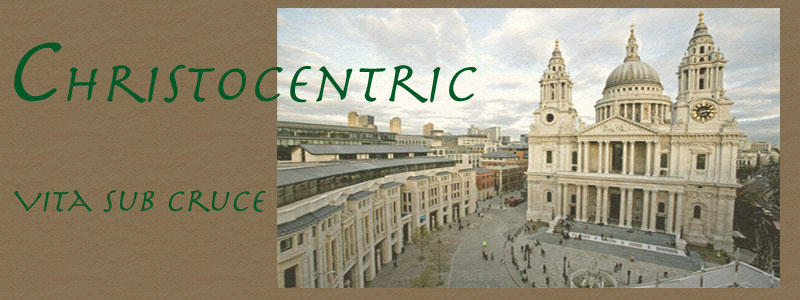Friday, September 25, 2009
The Truth About Truth
Allow me to refine my position on objectivity and truth seeking: A person doesn't find the truth through objective detachment, but by loving and passionately seeking the truth whatever it may be. Because of our pride we assume that we already know the truth, and so we find what we set out to seek. We turn history, or whatever it is we are studying, into a mirror that reflects our worldview. A person who loves the truth also likes to learn the truth, which often means admitting he was wrong.
Wednesday, September 16, 2009
The Freedom of a State Church
Does the disestablishment of religion in America make it harder for the church to influence the state?
Does the state have any absolute basis for law if it is officially separated from the church?
It's instructive to compare England and America on these questions. England has a state church and freedom of religion. We have freedom of religion and no state church. Americans tend to be more nervous about politicians with religious points of view. The British media seems to be more welcoming to religious points of view in the political dialogue. Try to imagine C.S. Lewis reading The Case for Christianity over American radio. He did just that on the BBC during WWII. Why does English Atheist Christopher Hitchens identify more with America than his native land? We have separation of church and state but his fatherland is still in bound to its medieval past. But only about 5% of the British population is in church on Sunday compared to about 35% in America. What's up?
After discussing this in class today a student piped up:
"A state-religion opens the door for the church and state to discuss issues, but it doesn't necessarily make the people of that state more Christian."
Pretty impressive for an eight grader, eh! What do you think? Comments?
Does the state have any absolute basis for law if it is officially separated from the church?
It's instructive to compare England and America on these questions. England has a state church and freedom of religion. We have freedom of religion and no state church. Americans tend to be more nervous about politicians with religious points of view. The British media seems to be more welcoming to religious points of view in the political dialogue. Try to imagine C.S. Lewis reading The Case for Christianity over American radio. He did just that on the BBC during WWII. Why does English Atheist Christopher Hitchens identify more with America than his native land? We have separation of church and state but his fatherland is still in bound to its medieval past. But only about 5% of the British population is in church on Sunday compared to about 35% in America. What's up?
After discussing this in class today a student piped up:
"A state-religion opens the door for the church and state to discuss issues, but it doesn't necessarily make the people of that state more Christian."
Pretty impressive for an eight grader, eh! What do you think? Comments?
Monday, September 14, 2009
Saturday, September 12, 2009
Sunday, September 6, 2009
Dimesdale Gets Clarity
 The Scarlet Letter by Nathaniel Hawthorne
The Scarlet Letter by Nathaniel HawthorneMy rating: 5 of 5 stars
Hester Prynne tells Dimmesdale that what we did had "a consecration of its own." Dimmesdale laments his adultery but withholds his confession. He decides to escape his tormentor and Hester's unfaithful husband, Chillingworth, by going to Europe with her and their child Pearl. But he immediately comes under an even more chilling Satanic torment that arises from within. He finally tells Hester that they violated "the sanctity of each others souls" and are suffering for it. The only way of escape is public confession for a very public sin.
The Puritans get a bad wrap for legalism, which is a common temptation for reformers. The problem is that Hawthorne gives an almost one-dimensional portrayal of them. The Puritans discipline Hester without trying to redeem her which is quite un-Puritan. It turns out that one of Hawthorne's ancestors was part of the Salem witch trials. It seems he wants to escape this cloud while retaining the Christian message of "hope through repentance." He called his friend Ralph Waldo Emerson "a denier of all that is and a seeker of he knows not what," and for that I love him.
The humanization of Pearl is particularly touching and powerful. Hester is a proto-feminist of sorts, who is primarily critiqued but might have pointed the way to better relations between men and women. This is a bit confusing, but Dimmesdale is the real hero, and Hawthorne gets most of his character right. I just wonder how he was able to preach while the guilt was eating away at him. Why does it destroy his body but not his mind? Nevertheless, Dimmesdale ends up doing the right thing before the guilt kills him, and he points the way to redemption and release for all involved. The story is ultimately satisfying because Hawthorne beautifully critiques Hester's Romanticism through Dimmesdale and affirms that children need repentant fathers. Bravo
View all my reviews >>
Saturday, September 5, 2009
Loving the Truth
We don't discover truth through objective detachment. We discover truth by loving the Truth.
Subscribe to:
Posts (Atom)
